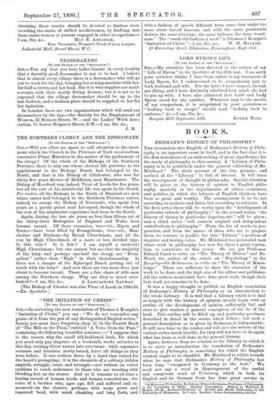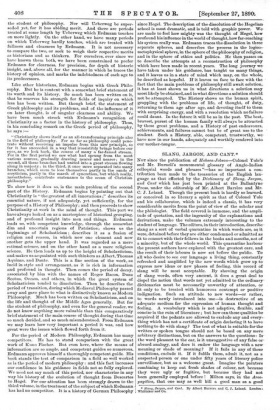BOOKS.
ERDMANYS HISTORY OF PHILOSOPHY.*
THE translation into English of Erdmann's History of Philo- sophy is an important event in itself, and in the fact that it is the first instalment of an undertaking of great significance for the study of philosophy in this country. A "Library of Philo- sophy is to be published, under the general editorship of Mr. Muirhead." The short account of the aim, pftrpose, and method of the " Library " is full of interest. It will trace the development of thought in philosophy. Special attention will be given to the history of opinion in English philo- sophy, specially in the departments of ethics, economics, and politics, in which the labours of English thinkers have been so great and worthy. The arrangement is to be, not according to authors and dates, but according to subjects. In the first series there will be works upon the "development of particular schools of philosophy ;" in the second series, "the history of theory in particular departments" will be given ; and a third series "will contain original and independent contributions to philosophy." From the list of works in pre- paration, and from the names of those who are to prepare them, we venture to predict for this " Library " a position of singular and lasting value. Mr. Muirhead has persuaded men whose work in philosophy has won for them a great reputa- tion, to contribute to this series. He has got Professor Eduard Caird to write on "The Theory of Ethics," and Dr. Ward, the author of the article on " Psychology " in the Encyclopaedia Britannica, to write on "The. Theory of Know- ledge." These are sufficient to show the character of the work to be done, and the high aim of the editor and publisher. All the writers mentioned have done good work, though their best work yet remains to be done.
It was a happy thought to publish an English translation of Erdmann's History of Philosophy as an introduction to the whole Library. It is well that a Library which is to deal so largely with the history of opinion, should begin with an outline of the development of opinion sufficiently full and clear to give readers a general conception of the lie of the land. This outline will be filled up, and particular provinces described in detail in the works which follow ; but such a general description as is given by Erdmann is indispensable.
It will save time to the reader, and will save the writers of the various series much trouble, for they will not have to do again what has been so well done in the general history.
Apart, however, from its relation to the Library to which it is to serve as introduction, the translation of Erdmann's History of Philosophy is something for which the English student ought to be thankful. Mr. Muirhead is within bounds when he says that Erdmann's History of Philosophy has been long "recognised in Germany as the best." We need not say a word in disparagement of the useful and competent work of Ucberweg, which in both its English and its German form has done great service to
• A History of Philosophy. By Johann Eduard Erdmann, Professor of Philosophy in the University of Halle. English Translation. Edited by WiWston Hough, Ph.M., Aesiatant-Profeasor of Mental and Moral Philosophy in the University of Minnesota. In 8 vols. London : Swan Sonnensohein and Co.
the student of philosophy. Nor will l7eberweg be super- seded yet, for it has abiding merit. And there are periods treated at some length by Ereberweg which Erdmann touches on more lightly. On the other hand, we have many periods on which treberweg hardly touches, which are treated with fullness and clearness by Erdmann It is not necessary to compare the two, or seek to weigh their respective merits as historians and as thinkers. For ourselves, ever since we have known them both, we have been constrained to prefer Erdmann for clearness, for precision, for depth of historic insight, and, above all, for the manner in which he traces the history of opinion, and marks the indebtedness of each age to its predecessors.
Like other historians, Erdmaun begins with Greek Philo- sophy. But he is content with a somewhat brief statement of its worth and its history. So much has been written on it, that he reserves his strength for fields of inquiry on which less has been written. But though brief, the statement of Greek philosophy and its problems, and of the influence of it on later thought, is of singular clearness and ability. We have been much struck with Erdmann's recognition of Christianity as a factor in the history of philosophy. Thus, in his concluding remark on the Greek period of philosophy, he says :— " Christianity shows itself as an all-transforming principle also in the field of philosophy. For as far as philosophy could pene- trate without receiving an impulse from this new principle, so far it has succeeded in a way that irresistibly brings before our eyes, as we look back, the course of many a far-famed stream. For in the first period we saw what had sprung from the most various sources, gradually drawing nearer and nearer; in the second, all these branches had united into a great stream flowing along in majesty ; in the third, it once more separated into many branches,' which seem to lose themselves partly in the sands of scepticism, partly in the marsh of syncretism, but which really, nevertheless, contribute sustenance to the ocean of Christian philosophy."
To show how it does so, is the main problem of the second part of the History. Erdmann begins by pointing out that Christianity is "the greatest of all innovations ;" describes its essential nature, if not adequately, yet sufficiently, for the purpose of a History of Philosophy; and then proceeds to show Christianity at work in the mind of thought. This part we have always looked on as a masterpiece of historical grouping, and of profound insight into men and things. Erdmann leads us, with competent knowledge, through the somewhat dim and uncertain regions of Patristics ; shows us the beginnings of Scholasticism ; describes it as a fusion of religion and reason, in which now one element and now another gets the upper hand. It was regarded as a mere rational science, and on the other hand as a mere religious science. He then leads us up to the height of Scholasticism, and makes us acquainted with such thinkers as Albert, Thomas Aquinas, and Dante. This is a fine section of the work, as lucid in style and arrangement, as it is rich in information and, profound in thought. Then comes the period of decay, associated by him with the names of Roger Bacon, Duns Scotus, Occam, and others, in which the great system of Scholasticism tended to dissolution. Then he describes the period of transition, during which Medimval Philosophy passed away and gave place to what is distinctively known as Modern Philosophy. Much has been written on Scholasticism, and on the life and thought of the Middle Ages generally. But for the student of philosophy, and even for the general reader, we do not know anything more valuable than this comparatively brief statement of the main course of thought during that time so much derided, and so much misunderstood. From Erdmann we may learn how very important a period it was, and how great were the issues which flowed forth from it.
For the period of Modern Philosophy, Erdmann has many competitors. He has to stand comparison with the great work of Kuno Fischer. But even here, where the means of information are so ample, and competent guides so numerous, Erdmann approves himself a thoroughly competent guide. His book stands the test of comparison in a field so well worked as is the period of modern philosophy : and this fact increases our confidence in his guidance in fields not so fully explored. We need not say much of this period, nor characterise in any way his history of the evolution of thought from Descartes to HegeL For our attention has been strongly drawn to the third volume, in the treatment of the subject of which Erdmann has had no competitor. It is a history of German Philosophy since Hegel. The description of the dissolution of the Hegelian school is most dramatic, and is told with graphic power. We- are made to feel how mighty was the thought of Hegel, how- profound his influence in the world of thought, how far-reaching- his system really was. Erdmann traces the dissolution in three separate spheres, and describes the process in the logico- metaphysical sphere, in the sphere of the philosophy of religion,. and in the sphere of ethics and politics. He then passes on to describe the attempts at a reconstruction of philosophy which have been made in recent years. The long journey we- have taken under his guidance, has taught us many things,- and it leaves us in a state of mind which may, on the whole, be described as hopeful. If it leaves us face to face with the fact that the main problems of philosophy still await solution,. it has at least shown us in what directions a solution may most likely be obtained, and in what directions a solution should not be attempted. The History shows us the human spirit, grappling with the problems of life, of thought, of duty,. returning to them age after age, and devoting itself to them with surprising energy, and with a resolution which no failure, could daunt. In the future it will be as in the past. The best,. bravest, purest of the human family will always be attracted_ by these great problems, and a History of past endeavours, achievements, and failures cannot but be of great use to the student. Such a History, able, competent, trustworthy, we have now in our hands, adequately and worthily rendered into our mother-tongue.



































 Previous page
Previous page